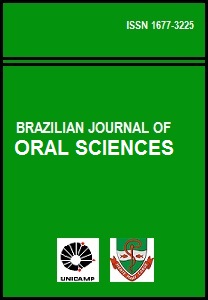Abstract
Aim: To evaluate the influence of plaster condition, dry or not, on the amount of residual monomer in heat-cured acrylic resin. Methods: Thirty acrylic resin specimens (65x10x3 mm) were fabricated and randomly assigned to 5 groups (n=6). The evaluated resins were heat-cured acrylic resins by conventional or microwave polymerization techniques and the plaster was previously dried in microwave oven in two groups. Each specimen was individually immersed in a test tube containing methanol (7 days) for surface analysis. In the groups for which internal monomer was evaluated, the specimens were fragmented and the small fragments were weighed prior to immersion in methanol. The analysis was made by high performance liquid chromatography (HPLC). Data were analyzed by ANOVA and Tukey test (p<5%) Results: showed statistical differences among the groups. Conclusions: The previous plaster drying influenced the residual monomer amount showing a decrease of these levels.
This work is licensed under a Creative Commons Attribution 4.0 International License.
Copyright (c) 2015 Tarcisio José de Arruda Paes-Junior, Rodrigo Furtado de Carvalho, Sâmia Carolina Mota Cavalcanti, Guilherme de Siqueira Ferreira Anzaloni Saavedra, Alexandre Luiz Souto Borges
Downloads
Download data is not yet available.

